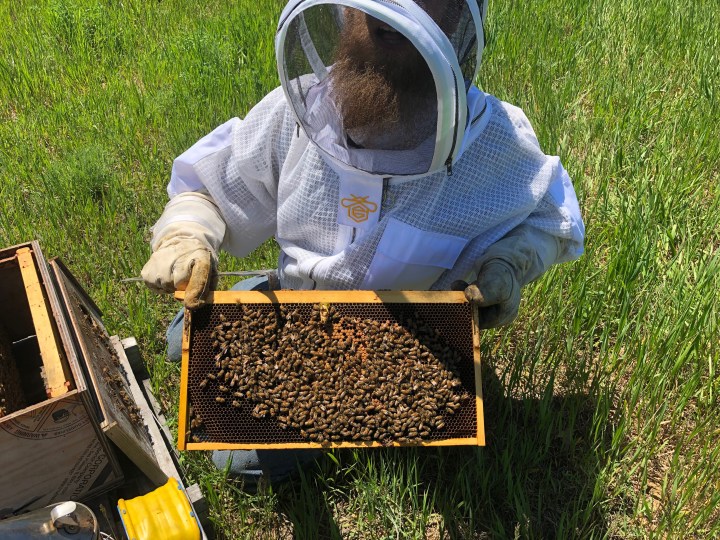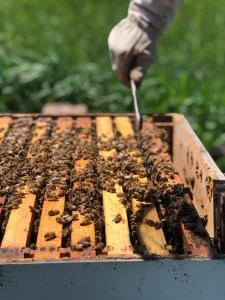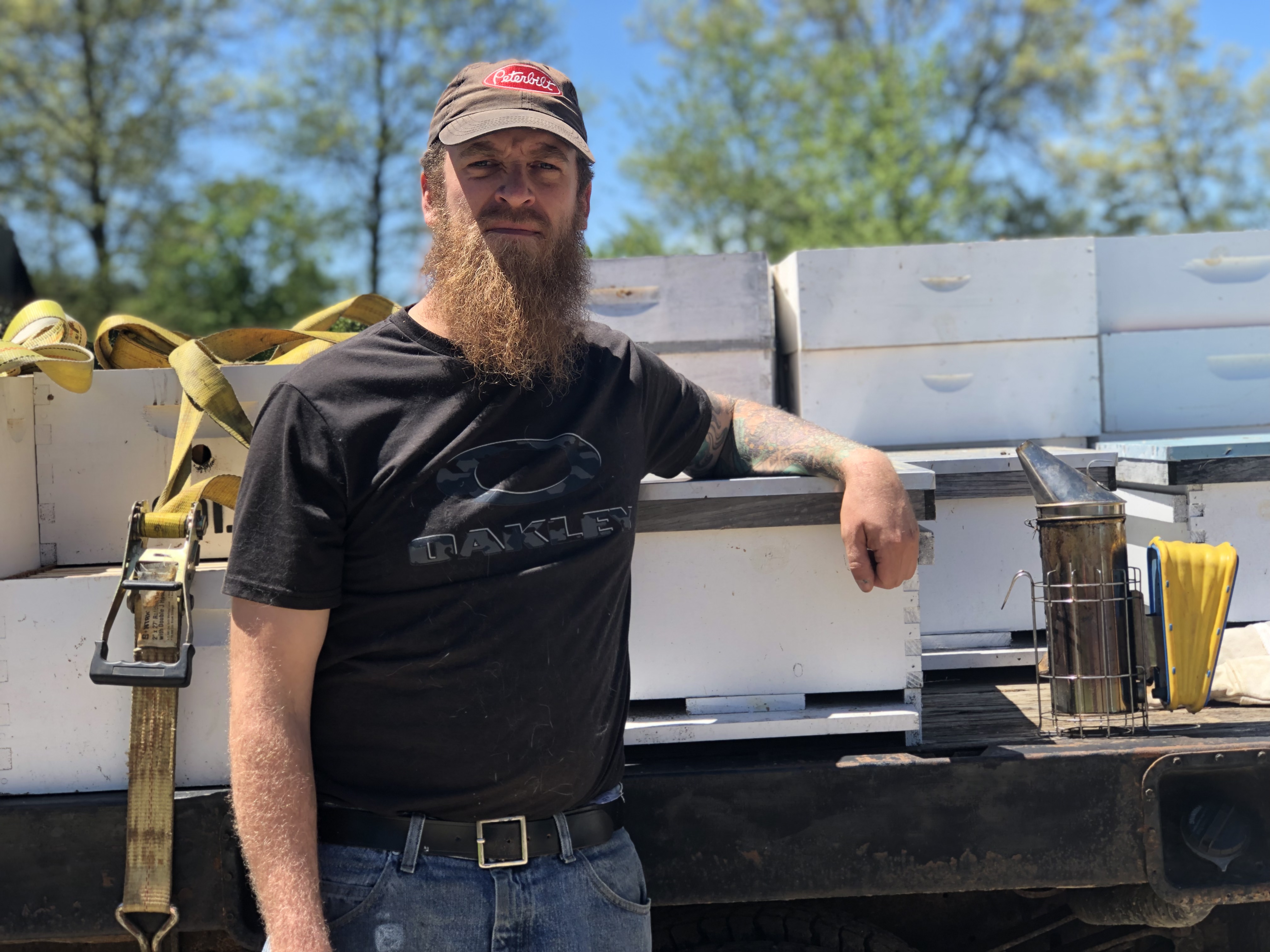By Kayla Sosa
Nick Kaminski is the recent grand prize winner of the Michigan Veteran Entrepreneur-Lab at Grand Valley State University’s Center for Entrepreneurship. Before MVE, Kaminski was involved with Heroes to Hives, a program that teaches veterans how to be beekeepers.
Kaminski is a beekeeper and owner of Hickory Tree Farm Apiaries.
CEI: Can you talk about what you learned through the MVE program?
Kaminski: I found out really quick, getting into MVE, how much I knew about bees and how little I knew about business. I had a lot of preconceived notions about what one needed to be to be an entrepreneur and what it really meant. Some of them were correct, and just like I learned with Heroes to Hives, some of my assertions I had before were not correct and MVE really helped me focus my idea and my passion for business into something that’s viable, scalable and, in the long term, profitable.
CEI: You won first place in the MVE showcase and pitch competition. Can you talk about what that experience was like for you, how much money you won and what you used the money for?
Kaminski: I would just like to take a moment to say thank you to my fellow cohort members and the facilitators of MVE. Really, they made the experience absolutely fantastic and helped me craft my business into what it is today, in order to go forth with the grant money. But, the final showcase really was wonderful. It was fantastic to see all of my other cohort members present their showcases, or their presentations, and then winning the actual contest itself was very surreal and it was certainly a wonderful moment to have my wife and my mother and father there to help share that moment with me. And taking the $5,000 grand prize and purchasing 26 single brew chamber hives, which has increased our beekeeping operation somewhere about five years down the road in progress overnight, has been an immense help and just an amazing blessing that we are truly grateful for.
CEI: Do you bottle and sell the honey?
Kaminski: Yes, I do bottle and sell our Hickory Tree Farm Apiary Honey. Most of the time I’ll sell it on Facebook, I’ll put posts up there and a lot of word to mouth sales. We have considered opening up a website soon. As we have more hives, we’re going to have a lot more volume and we’re also going to be looking for smaller retailers. We would love to have a partnership with a brewery, or something like that, a smaller craft brewery that we could supply local honey to. I think it would be really special to partner with somebody like that, local to the area, and make something that’s very special to just West Michigan.

CEI: How many bees do you have and where are they from?
Kaminski: Currently right now we’re sitting on about 36 hives. Probably at the end of today or maybe a week from now we’ll be at about 60, as we go ahead and split those off into smaller hives to begin the process of building them up for overwintering. The majority of my stock I was able to purchase from another beekeeper with the money that I earned through the grant process of Michigan Veteran Entrepreneurship Lab. So that was really an amazing feat to be able to increase the size of our apiary literally tenfold overnight and be able to start coming out as a serious apiary and honey bee business. But the main premise of my apiary, or my bee farm, is around my feral genetics. I had very poor success in the beginning as a beekeeper and buying bees is very expensive so what I started to do was capture feral colonies. I would cut them out of people’s walls or I would capture wild honeybee swarms. And I after I did that, I noticed just how well they did, and so I decided I would start breeding a line of queens based off of my feral, how do you say, ‘mutt queen genetics.’
CEI: What is the process of beekeeping?
Kaminski: The whole process of beekeeping starts with the bees themselves and starting out a hive, which is how I came to the conclusion I am right now, raising queens and nucleuses. When you start out beekeeping, you typically will purchase a packet of bees or a nucleus colony and I started doing that myself, and after a while I started catching wild hives and turning them into my own hives and starting my own nucs and queens. So it kind of started out as a little bit of a hobby and grew into a passion and now we’re turning into a full time business.

CEI: What safety precautions do you take before going out to the hives?
Kaminski: A lot of people are very wary of beekeeping from the start. They’re concerned. And, after all, at the end of the day, we are talking about the keeping of a venomous insect. Yes, bees do have the potential to kill people who are subject to anaphylaxis from venomous insect stings like bees, wasps, hornets. So, there is that precaution to keep in mind. However, though, I think what a lot of people don’t realize right off the bat is that beekeeping can be and is very therapeutic. That’s something that we cover quite heavily when we’re talking about the programs we offer in Heroes to Hives is we really want to help represent that therapeutic aspect of beekeeping; taking the time to slow down and move at the tempo of the bees instead of what your idea or preconceived notion of what the tempo of life should be.
I find myself often times, you know if I come home from a long stressful day at work, slowing down and working through my hives at the bees’ pace, observing them and seeing how they are in the hives, it really is beneficial. So, the best safety precaution one can take is really just to slow down, slow down and work gently with the bees. But I would always recommend someone just starting their beekeeping experience, to wear as much protective equipment as they need to feel comfortable with the bees at first. Because after all this is about enjoying the time with your bees, not necessarily seeing who can wear the least amount of gear when keeping the bees.
CEI: Does the therapeutic part of the process help you deal with some of your negative experiences as a veteran?

Kaminski: Every veteran’s experience at war is different, from what I can tell. And my experiences often times led me to be impatient, short-tempered and, most often, frustrated and having an overall lack of fulfillment in day to day life and trying to adjust to my role in the civilian world. And many veterans can seek and receive therapy through beekeeping in many different aspects, but one that I can speak personally from is having the sensation of a role of importance, knowing that what you’re doing is of great importance. To be taking care of bees today in the United States when the European honey bee faces some of the steepest challenges it ever has and when we’re talking about those challenges, we’re talking about Colony Collapse Disorder, we’re talking about Varroa Mites, we’re talking about European Foulbrood, American Foulbrood.
We’re talking about a lot of these issues and so we have a very highly skilled population of veterans out there that are searching for a purpose in life, they’re searching for that purposeful goal and when I think about the United States Military, and I think about one of the most formidable forces in the world. And when I think about the plight that’s facing our honeybees, I think about one of the biggest challenges. So I think it’s foolish for us not to take our veterans and retrain them as beekeepers. Let’s go ahead and use the most powerful military in the world to take on this problem of the honeybee crisis.
CEI: What was your service in the military like?
Kaminski: I’m a veteran of the United States Marine Corps. I joined the Marine Corps when I was 17, I went to bootcamp when I was 18 right after I graduated high school in 2003. I spent just about 12 years in the Marine Corps as a field artillery man. I started out as a Fire Aggression Controlman and ended as an Operations Chief teaching at the schoolhouse in Fort Sill. My time in the Marine Corps was incredibly rewarding, although challenging at times. I went to Iraq twice, Afghanistan once. There’s certainly a lot to be said about the amount of sacrifice service members are giving nowadays knowing what they’re going into joining the armed forces during this particular time period. I’d like to say that I enjoyed serving with some of the finest men and women I’ll have ever met while I was in.
CEI: Can you talk about the honeybee crisis and the environmental impact?
Kaminski: The issues that we’re dealing with with honeybees right now are very wide ranging. The biggest concern I think we’re facing is the near epidemic level of Varroa Mite infestation. Varroa Mites are a parasitic mite that plague honeybees and oftentimes can reach such high levels that they will cause the colony to die. If they don’t die in the summertime, they will most certainly die in the winter time, and it’s up to beekeepers to learn how to appropriately manage these pests and monitor their mite levels in order to curb this historic and record die off in honeybee colonies. Additionally, there are many other things affecting our honeybees right now; certain types of pesticides can lead to the collapse of honeybee colonies but the biggest thing we’re facing right now is the Varroa Mite.

CEI: I have to ask, how many times have you been stung?
Kaminski: I have no idea how many times I’ve been stung. I can tell you I’ve been stung in nearly every place of my body from head to toe. Literally on the head, in between the eyes, in the cheek, in the ear, and the noes, on the toes, on the legs, on the fingers, on the wrist. I’ve been stung everywhere and it’s not something that you totally get used to but I can tell you that there is something out there called Bee Venom Therapy. And like many veterans, I suffer from chronic back pain, mine is due to arthritis in my vertebrae and I actually receive some benefit from the bee stings. They are anti-inflammatory. So, I don’t go out particularly looking to get stung, but I don’t necessarily stop it when it does happen.
CEI: So you have a 3 year old and a 7 year old. How are they involved with the apiary?
Kaminski: Both of my boys join me frequently, almost daily, in the workshop as we prepare honey bee equipment, building honey bee boxes and frames and cleaning old equipment and getting it ready for use. My 7 year old joins me in the bee yard. He has a bee suit that he wears that’s just for children. And he’s actually quite good at finding the queen if you show him the frame that she’s on, he can find her. I think it’s really special because this is the family farm that we live on and that we’ve established Hickory Tree Farm Apiaries on. So, it’s very important to me that I get to share these experiences with my sons when they’re very young and to hopefully create a very large and successful business that maybe one day, if they choose to, they’ll be able to run, pass onto their children. It’s really important to me that I spend as much time as I can with my children. And spending time with them and the bees is something very special that I enjoy.

CEI: If you could tell people one thing about beekeeping – or debunk a myth – what would you say?
Kaminski: Bees are far less aggressive than what people would think. Yes, bees can become quite defensive of their hive when provoked, but the majority of my honey bee colonies I’m able to work them with relative ease and not get too many stings. I always like to tell new beekeepers that a sting is just a reminder to slow down a little bit. If there’s one thing the people should really understand, it’s that honeybees are not aggressive, there’s no need to try to spray them and they really are in danger, so don’t try to spray them or anything, just call a beekeeper and have us come handle the problem. They’re not aggressive and they’re not of any harm to you.
CEI: What is the plan looking forward to the future? Do you want to keep expanding your apiary business?
Kaminski: Our plans for the future are to keep on expanding as big and as fast as we possibly can. Yes, there will be plateaus where we’re going to have to stop and readjust for some growing pains and get some different equipment and rearrange some things. My biggest pet peeve, I’d have to say, is when people talk about a business and they say ‘Well, I don’t want it to get that big.’ You know, they’ll want to stop at a certain point. Or they say, ‘I don’t want any employees, I just want it to be me.’ My opinion is that this isn’t about me, it’s about the bees. And I’m going to try to make as many bees as I can and I will let it get as big as it can. If I can have employees and enrich somebody else’s life with the ability to make a living working with bees, I think that’s a fantastic thing.

